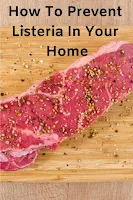Foodborne illnesses should concern all of us. Foodborne illnesses include E. coli, listeria and other bacteria that can make us sick and even cause death. Last summer the worst listeria outbreak ever occurred in cantaloupe. There are many things we can do in our homes to prevent foodborne illness. Learn about the symptoms, treatment, and prevention of listeria.
Listeria is another one of the many types of bacteria that cause foodborne illness. It is important you know the causes, prevention and health risks of listeria.
What is Listeria?
Listeria is in the soil, the water and it gets into animals without the animal showing any signs of illness. When it gets into humans, it can make us sick. Listeria (listeriosis) is a foodborne illness that sickens 1,600 people per year in the United States and approximately 260 people die each year.
Listeria comes from the bacterium Listeria monocytogenes and is usually caused by eating food that has been contaminated with these bacteria.
Health Risks of Listeria
Pregnant women are at a higher risk. According to the Center for Disease Control (CDC), pregnant women account for 17% of all listeria cases in theUnited States and are 20 times more likely to get listeria than a healthy person.
A pregnant woman with listeria might just have mild flu-like symptoms, but if it should be passed onto the unborn baby, that is a major health risk that can lead to miscarriages, premature delivery, stillbirths or a serious infection in the newborn baby.
If antibiotics are given right away; the listeria can be cured preventing the unborn baby from getting it.
People with AIDS or other lowered immune systems such as those who recently underwent a transplant had chemotherapy or have certain diseases like cancer, diabetes, kidney or liver disease. The elderly also have a higher health risk.
People with AIDS or other lowered immune systems such as those who recently underwent a transplant had chemotherapy or have certain diseases like cancer, diabetes, kidney or liver disease. The elderly also have a higher health risk.
The Causes of Listeria
- Raw animal foods like beef, pork, and poultry.
- Unpasteurized dairy products like milk and cheese.
- Raw fruits and vegetables can be contaminated because of contact with the listeria bacteria through the soil, water, fertilizer or a contaminated surface.
- Some processed foods such as deli meats, hot dogs, smoked fish, and soft cheeses. These processed foods can pick up the listeria bacteria after they have been cooked before packaging.
The Symptoms and Treatment for Listeria
The symptoms of listeria can range from mild to severe, depending on your health risk factors and if the listeria has affected the nervous system. If the listeria bacteria are not in the nervous system, the symptoms are a flu-like feeling and include:
- Nausea
- Diarrhea
- Fever and chills
- Symptoms might also include vomiting
Listeria that enters the nervous system is very dangerous and can turn into encephalitis or bacterial meningitis which can be life-threatening illnesses if not treated immediately. If the following symptoms occur, seek emergency medical treatment right away:
- High fever
- Severe headache
- Stiff neck to the point it is hard to impossible to turn your neck
- Confusion or a change in alertness
- Losing your balance
- Convulsions
- Sensitivity to light
Symptoms of listeria usually occur two to three weeks after eating the contaminated food but can occur as soon as a couple of days or as long as two months after eating the contaminated food.
If you believe you have eaten food that has been recalled, pay close attention to your health and if you develop any symptoms, you should see your doctor immediately.
A doctor will take a blood test to find out if you have been infected or a spinal fluid test if it is suspected the listeria has gotten into the nervous system.
The treatment for listeria is antibiotics and if it is severe enough, a course of several types of antibiotics can be used.
2011 Listeria Outbreak
During the summer of 2011, there is an outbreak of listeria in Colorado that has caused the death of at least three people and hospitalized 22 others. The cause has been linked to cantaloupe grown at one farm in Colorado (not Rocky Ford), but for now, no one knows how the listeria bacteria get onto the cantaloupe. Some suspect it could have been from contaminated trucks.
Since no one eats the outside of a cantaloupe, this shows the importance of washing the outside of fruits like cantaloupe and watermelon before cutting into them.
If the outside of the cantaloupe has the listeria bacteria on it, cutting into the cantaloupe with a knife can transfer the listeria into the edible fruit of the cantaloupe.
How to Prevent Listeria
The way to prevent getting listeria is the same as for other foodborne illnesses. You should take the following steps to limit your health risks.
- Wash all fruits and vegetables. You can rinse or wash fruits and vegetables with water or a little soap and warm water. I had never thought of rinsing or washing the outside of cantaloupe until this recent listeria outbreak occurred.
- Keep uncooked meat away from all other foods.
- Make sure you wash all utensils, cutting boards and plates after using them with raw meat before using them with other meats or vegetables. You can transfer listeria or other bacteria if you do not wash them immediately before using them again.
- Wash your hands after touching raw meat, vegetables, and fruits.
- Cook all meat, poultry, and fish to the proper temperature. Use a meat thermometer, since you cannot tell just by looking. This guide will ensure you cook meat at the right temperature.
- Make sure all dairy products including soft cheeses say pasteurized on the package.
- It is also important to know that listeria can actually grow at refrigerator temperatures. So wash everything first.
- Listeria bacteria are killed by proper cooking and pasteurization.
Conclusion
By taking these simple precautions, you can prevent your family and yourself from getting listeria, E.coli or a number of other foodborne illnesses. For more about E. coli, please readThe Causes, Symptoms, and Prevention of E. coli.
About the Author
Sam Montana is a certified Food Over Medicine instructor from the Wellness Forum Health Center and certified in optimal nutrition from the Harvard T.H. Chan School of Public Health.
Copyright © September 2011-2019 Sam Montana

